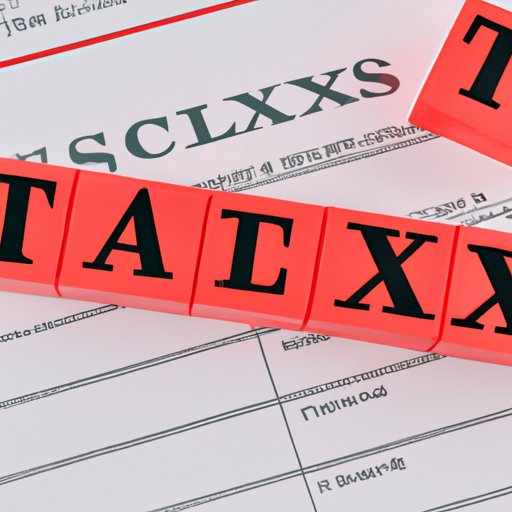
I. Introduction
Filing taxes can be stressful, and it’s easy to forget the deadline. Unfortunately, if you miss it, you’ll be facing a range of penalties, fines, and interest charges. In this article, we’ll explore what happens if you don’t file taxes on time and provide practical tips and solutions for those who find themselves in this predicament.
II. Legal Consequences
The legal consequences of not filing taxes on time can be severe. Penalties usually range from 5% to 25% of the total tax owed, plus interest on the unpaid balance. In some cases, the IRS may even file a substitute return on your behalf, which is usually inaccurate and could result in a higher tax bill. The government can also seize your assets or garnish your wages to collect unpaid taxes, which can have long-term financial consequences.
To illustrate, consider an example where someone owes $10,000 in federal taxes. If they don’t file their taxes on time, they’ll be hit with a 5% penalty, which amounts to $500. If they don’t pay the tax owed within 60 days of the due date, they’ll face an additional penalty of 0.5% per month until it’s paid in full. And if they don’t address their tax debt, the IRS can initiate collection proceedings, which could lead to wage garnishments, bank levies, and property seizures.
III. Importance of Prompt Filing
Filing taxes on time is essential for avoiding penalties and interest charges, which can add up quickly. Also, filing promptly can help you get your refund more quickly. According to the IRS, the average refund in 2020 was over $2,500, which could come in handy if you’re trying to pay down debt or save for a rainy day. Plus, filing taxes promptly can help you avoid the stress and hassle of trying to catch up later.
Did you know that the IRS processes roughly 150 million tax returns annually? And despite the high volume, their systems are capable of processing most returns within 21 days. By filing promptly, you’ll be doing your part to keep the system running smoothly, which benefits everyone.
IV. Tips for Avoiding Penalties
If you’ve missed the tax deadline, the good news is that you can do a few things to minimize the amount of penalties you’ll have to pay. Firstly, file your return as soon as possible. Even if you can’t pay the full amount owed, filing your return promptly reduces the failure-to-file penalty. Secondly, pay as much as you can upfront. The longer you wait to pay, the more interest and penalties you’ll accrue. Finally, consider seeking professional help. A qualified tax professional can guide you through the process and help you minimize your tax debt.
V. Steps to Take if You Missed the Deadline
If you miss the tax deadline, it’s important to take action right away. Firstly, file your late return as soon as possible to minimize the failure-to-file penalty. You can submit your return electronically or by mail. Secondly, pay as much as you can upfront to minimize interest and penalties. If you can’t pay your balance in full, consider setting up a payment plan with the IRS. You can either apply for a short-term extension of up to 120 days or a long-term payment plan of up to six years. Finally, stay in contact with the IRS and respond promptly to any communication you receive.
VI. Brief History of Tax Law
Taxes have been around for centuries, and they’ve evolved significantly over time. In the United States, income taxes were first introduced in 1862 to help fund the Civil War. In 1913, the 16th Amendment to the Constitution gave Congress the power to levy taxes on income, which soon became the primary source of funding for the federal government. Since then, the tax code has become more complex and has undergone numerous changes, with new regulations, deductions, and credits added over time.
VII. How the Government Uses Tax Revenue
Taxes are the government’s primary source of revenue, and they’re used to fund important projects and services that benefit society as a whole. Revenue from taxes is used to pay for infrastructure projects like roads, bridges, and schools. It’s also used to fund social programs like Social Security, Medicare, and Medicaid. Taxes also help to fund the military and national defense. Without taxes, the government would struggle to provide the basic services and protections that we all rely on.
VIII. Tax Benefits
Although paying taxes may be a necessary evil, there are some advantages to doing so. Firstly, filing taxes on time can help you avoid penalties and interest charges, as we’ve discussed. Secondly, you may be eligible for tax credits and deductions that can reduce your tax bill. Thirdly, you may be entitled to a refund if you overpaid your taxes during the year. If you’re not sure which deductions and credits apply to your situation, consider working with a tax professional who can guide you through the process.
IX. Conclusion
In conclusion, filing taxes on time is essential for avoiding penalties, interest charges, and legal consequences. If you miss the deadline, take action right away to minimize the amount you’ll have to pay. Consider seeking professional help, filing your return promptly, and setting up a payment plan if you can’t pay your balance in full. By following these steps, you’ll be on your way to resolving your tax issues and avoiding future headaches.
Call to Action: If you’ve missed the tax deadline, take action right away to minimize the penalties and interest charges. Consider seeking professional help or setting up a payment plan to help you get back on track.




